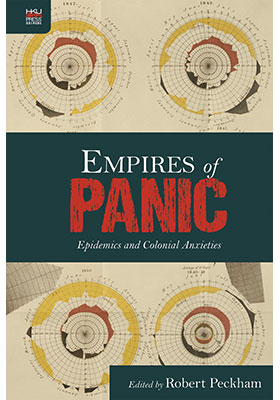Empires of Panic
Epidemics and Colonial Anxieties
(恐慌帝國:傳染疫病與殖民地的憂慮)
ISBN : 978-988-8208-44-9
January 2015
256 pages, 6″ x 9″, 7 b&w illus.
- HK$350.00
Ebooks
Empires of Panic is the first book to explore how panics have been historically produced, defined, and managed across different colonial, imperial, and post-imperial settings—from early nineteenth-century East Asia to twenty-first-century America. Contributors consider panic in relation to colonial anxieties, rumors, indigenous resistance, and crises, particularly in relation to epidemic disease. How did Western government agencies, policymakers, planners, and other authorities understand, deal with, and neutralize panics? What role did evolving technologies of communication play in the amplification of local panics into global events? Engaging with these questions, the book challenges conventional histories to show how intensifying processes of intelligence gathering did not consolidate empire, but rather served to produce critical uncertainties—the uneven terrain of imperial panic.
“Charting the relays of rumor and knowledge that stoke colonial fears of disease, disorder, and disaster, Empires of Panic offers timely and cautionary insight into how viscerally epidemics inflame imperial anxieties, and how words and their communication over new technologies accelerate panic, rally government intervention, and unsettle and entrench the exercise of global power. Relevant a century ago and even more so today.” —Nayan Shah, University of Southern California; author of Contagious Divides: Epidemics and Race in San Francisco’s Chinatown
“Empires generated anxiety as much as ambition. This fine study focuses on anxieties generated by disease. It is the first book of its kind to track shifting forms of panic through different geopolitical regimes and imperial formations over the course of two centuries. Working across medical and imperial histories, it is a major contribution to both.” —Andrew S. Thompson, University of Exeter; author of Empire and Globalisation: Networks of People, Goods and Capital in the British World, c. 1850–1914 (with Gary B. Magee)




